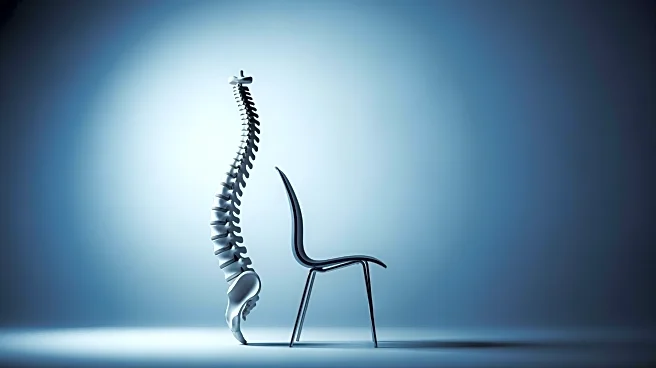What's Happening?
Headaches are a common ailment affecting many individuals, with varying degrees of severity and duration. Dr. Katy Munro, a GP and expert at the National Migraine Centre, provides insights into managing
headaches through lifestyle changes. She suggests that while headaches can be concerning, they are rarely indicative of serious health issues. Dr. Munro recommends keeping a headache diary to identify triggers, such as weather changes or hormonal fluctuations. She advises using caffeine wisely, as it can enhance the effectiveness of painkillers but should be consumed in moderation to avoid withdrawal headaches. Additionally, maintaining a balanced diet similar to the Mediterranean diet, regular exercise, adequate sleep, and hydration are crucial in managing headache symptoms. Dr. Munro also cautions against the frequent use of painkillers containing codeine, as they may exacerbate headache frequency and symptoms.
Why It's Important?
The advice provided by health experts like Dr. Munro is significant as it offers practical, non-pharmaceutical strategies for managing headaches, which can improve the quality of life for many individuals. By understanding and identifying personal headache triggers, individuals can take proactive steps to mitigate their occurrence. The emphasis on lifestyle adjustments, such as diet and hydration, highlights the interconnectedness of overall health and headache management. This approach can reduce dependency on medication, particularly those with potential side effects like codeine, and promote healthier living habits. The broader impact includes potential reductions in healthcare costs and improved productivity, as individuals learn to manage headaches more effectively.
What's Next?
Individuals experiencing frequent or severe headaches are encouraged to consult with healthcare professionals to explore tailored treatment options. As awareness of lifestyle factors in headache management grows, there may be increased interest in research and development of non-pharmaceutical interventions. Healthcare providers might focus on educating patients about the benefits of maintaining headache diaries and making dietary and lifestyle changes. Additionally, public health campaigns could emphasize the importance of hydration and balanced nutrition in preventing headaches, potentially leading to broader societal shifts towards healthier living practices.
Beyond the Headlines
The exploration of lifestyle factors in headache management underscores the importance of holistic health approaches. This perspective may influence future healthcare policies, encouraging a shift from medication-centric treatments to integrative health strategies. Ethical considerations arise regarding the promotion of non-pharmaceutical interventions, ensuring that individuals have access to accurate information and support. Long-term, this could lead to cultural shifts in how headaches and other common ailments are perceived and treated, fostering a more proactive and preventive health culture.











